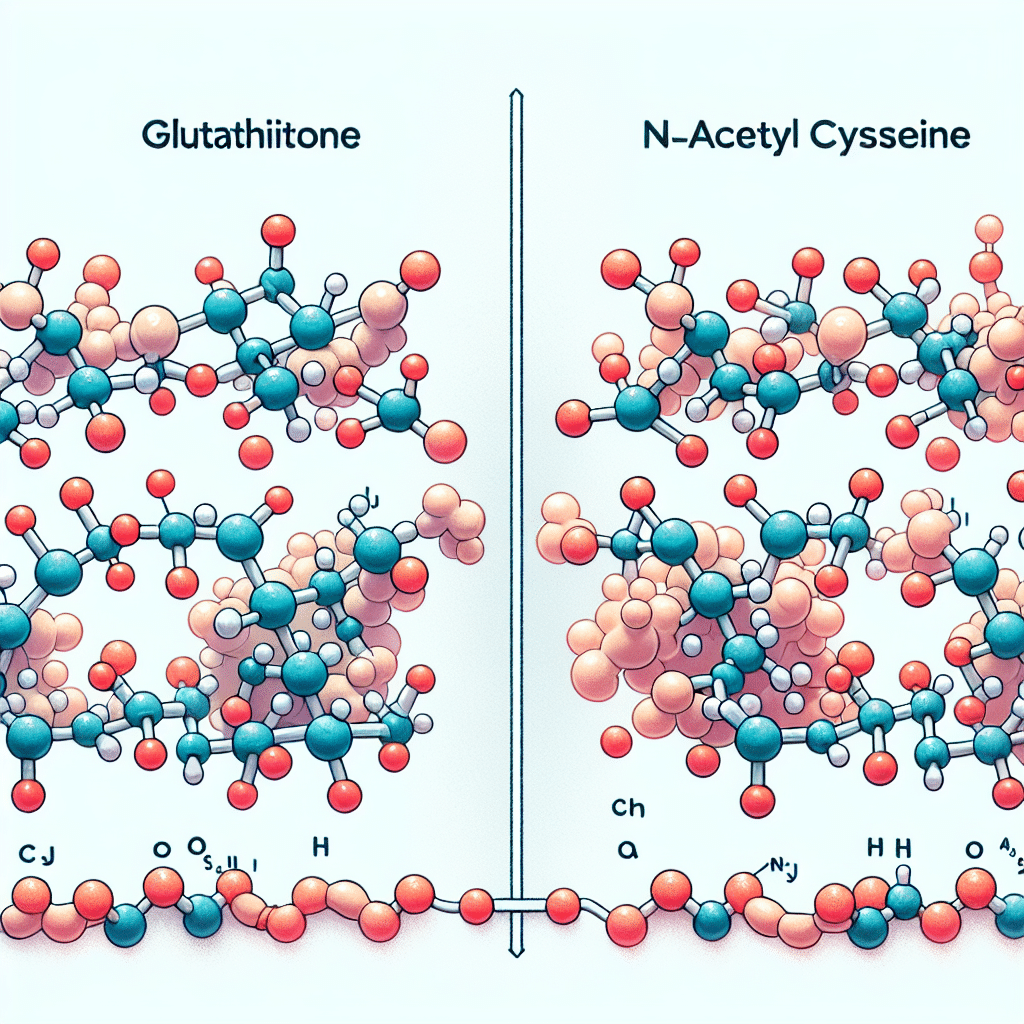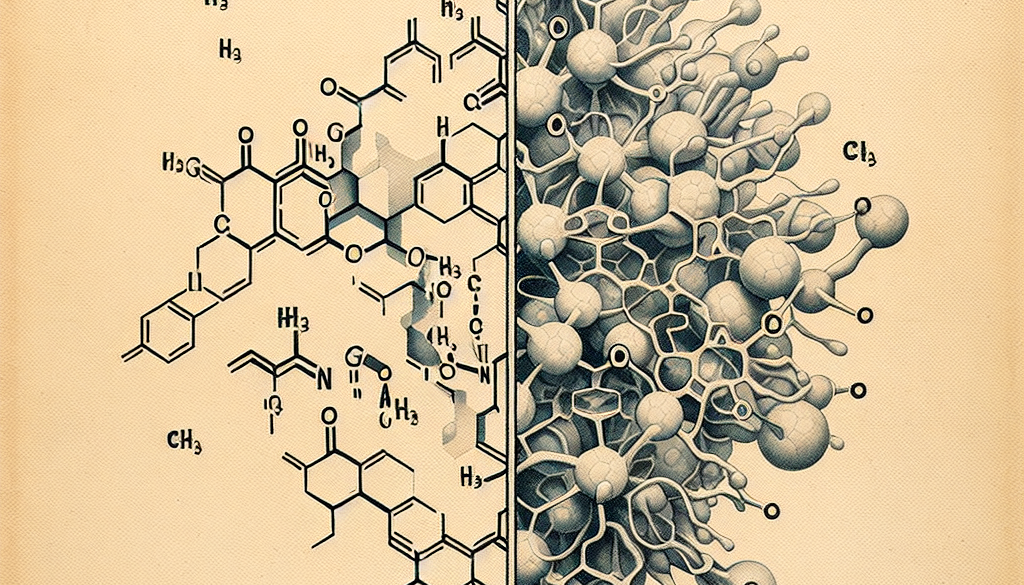Glutathione or N-Acetyl Cysteine: Which One?
-
Table of Contents
- Glutathione vs. N-Acetyl Cysteine: Optimal Antioxidant Intake
- Understanding Glutathione: The Master Antioxidant
- N-Acetyl Cysteine: Precursor to Glutathione
- Comparing Benefits and Uses
- Glutathione for Cellular Health and Detoxification
- NAC for Respiratory and Liver Support
- Scientific Evidence and Case Studies
- Glutathione in Clinical Trials
- NAC in Research Studies
- Choosing Between Glutathione and NAC
- Conclusion: Making an Informed Decision
- Enhance Your Health with ETprotein’s Protein Products
Glutathione vs. N-Acetyl Cysteine: Optimal Antioxidant Intake

When it comes to maintaining optimal health, antioxidants play a crucial role in protecting our cells from oxidative stress and damage. Among the plethora of antioxidants, glutathione and N-Acetyl Cysteine (NAC) stand out for their unique benefits and functions within the body. Deciding which one to incorporate into your health regimen can be a complex decision. This article delves into the science behind these powerful compounds, comparing their benefits, uses, and how they work in the body to help you make an informed choice.
Understanding Glutathione: The Master Antioxidant
Glutathione is often referred to as the “master antioxidant” due to its central role in the body’s detoxification process and its ability to recycle other antioxidants. It is a tripeptide composed of three amino acids: cysteine, glutamate, and glycine. Glutathione is naturally produced by the body and is present in every cell, with particularly high concentrations in the liver, where it aids in detoxification.
- Protects cells from oxidative damage
- Supports immune function
- Detoxifies harmful substances
- Regenerates vitamins C and E
- Contributes to the metabolism of toxins and carcinogens
Despite its critical functions, certain factors such as poor nutrition, environmental toxins, stress, and aging can deplete glutathione levels, making supplementation beneficial in some cases.
N-Acetyl Cysteine: Precursor to Glutathione
N-Acetyl Cysteine (NAC) is a derivative of the amino acid L-cysteine and is considered a precursor to glutathione. NAC has gained popularity as a dietary supplement due to its ability to boost glutathione levels and its direct antioxidant properties.
- Acts as a mucolytic agent, breaking down mucus in the respiratory system
- Helps replenish glutathione levels in the body
- Exhibits anti-inflammatory effects
- May improve psychiatric disorders and addictive behaviors
- Offers neuroprotective benefits
NAC’s versatility makes it a valuable supplement for a variety of health conditions, particularly those involving the respiratory system and liver health.
Comparing Benefits and Uses
Both glutathione and NAC offer significant health benefits, but their uses can differ based on individual health goals and conditions.
Glutathione for Cellular Health and Detoxification
Glutathione is essential for maintaining cellular health and preventing damage from free radicals and peroxides. It is particularly beneficial for individuals looking to enhance their body’s detoxification processes or those with conditions that are associated with oxidative stress, such as chronic diseases and neurodegenerative disorders.
NAC for Respiratory and Liver Support
NAC is well-known for its role in treating acetaminophen (Tylenol) overdose and protecting the liver from its toxic effects. Additionally, due to its mucolytic properties, NAC is often used to manage conditions like chronic bronchitis and cystic fibrosis.
Scientific Evidence and Case Studies
Research has provided insights into the effectiveness of both glutathione and NAC in various health contexts.
Glutathione in Clinical Trials
Clinical trials have demonstrated the potential of glutathione in improving symptoms of Parkinson’s disease, reducing oxidative stress in diabetes patients, and enhancing the immune response in HIV/AIDS.
NAC in Research Studies
Studies on NAC have shown promising results in treating psychiatric disorders such as depression and bipolar disorder, reducing the severity of influenza, and even playing a role in cancer prevention and therapy.
Choosing Between Glutathione and NAC
When deciding whether to supplement with glutathione or NAC, consider the following factors:
- Your specific health goals and needs
- The bioavailability of each supplement
- Potential interactions with other medications
- Recommendations from healthcare professionals
It’s important to note that while NAC can be an effective way to boost glutathione levels, some individuals may benefit more from direct glutathione supplementation, especially in cases where absorption or conversion from NAC may be compromised.
Conclusion: Making an Informed Decision
In conclusion, both glutathione and N-Acetyl Cysteine offer substantial health benefits, and the choice between them should be based on individual health concerns, goals, and the advice of healthcare professionals. While glutathione serves as a powerful intracellular antioxidant, NAC provides a more targeted approach to boosting glutathione levels and addressing specific health issues. By understanding the unique properties and applications of each, you can make a well-informed decision on which supplement is best suited for your health regimen.
Enhance Your Health with ETprotein’s Protein Products
After considering the benefits of glutathione and NAC, it’s also important to recognize the role of high-quality protein in supporting overall health. ETprotein offers a range of organic bulk vegan proteins that can complement your antioxidant intake and contribute to a balanced diet. Their products, including Organic rice protein, pea protein, and various seed proteins, are non-GMO, allergen-free, and characterized by a neutral taste, making them an excellent choice for anyone looking to improve their nutritional intake.
About ETprotein:
ETprotein, a reputable protein and L-(+)-Ergothioneine (EGT) Chinese factory manufacturer and supplier, is renowned for producing, stocking, exporting, and delivering the highest quality organic bulk vegan proteins and L-(+)-Ergothioneine. They include Organic rice protein, clear rice protein, pea protein, clear pea protein, watermelon seed protein, pumpkin seed protein, sunflower seed protein, mung bean protein, peanut protein, and L-(+)-Ergothioneine EGT Pharmaceutical grade, L-(+)-Ergothioneine EGT food grade, L-(+)-Ergothioneine EGT cosmetic grade, L-(+)-Ergothioneine EGT reference grade and L-(+)-Ergothioneine EGT standard. Their offerings, characterized by a neutral taste, non-GMO, allergen-free attributes, with L-(+)-Ergothioneine purity over 98%, 99%, cater to a diverse range of industries. They serve nutraceutical, pharmaceutical, cosmeceutical, veterinary, as well as food and beverage finished product distributors, traders, and manufacturers across Europe, USA, Canada, Australia, Thailand, Japan, Korea, Brazil, and Chile, among others.
ETprotein specialization includes exporting and delivering tailor-made protein powder and finished nutritional supplements. Their extensive product range covers sectors like Food and Beverage, Sports Nutrition, Weight Management, Dietary Supplements, Health and Wellness Products, and Infant Formula, ensuring comprehensive solutions to meet all your protein needs.
As a trusted company by leading global food and beverage brands and Fortune 500 companies, ETprotein reinforces China’s reputation in the global arena. For more information or to sample their products, please contact them and email sales(at)ETprotein.com today.












